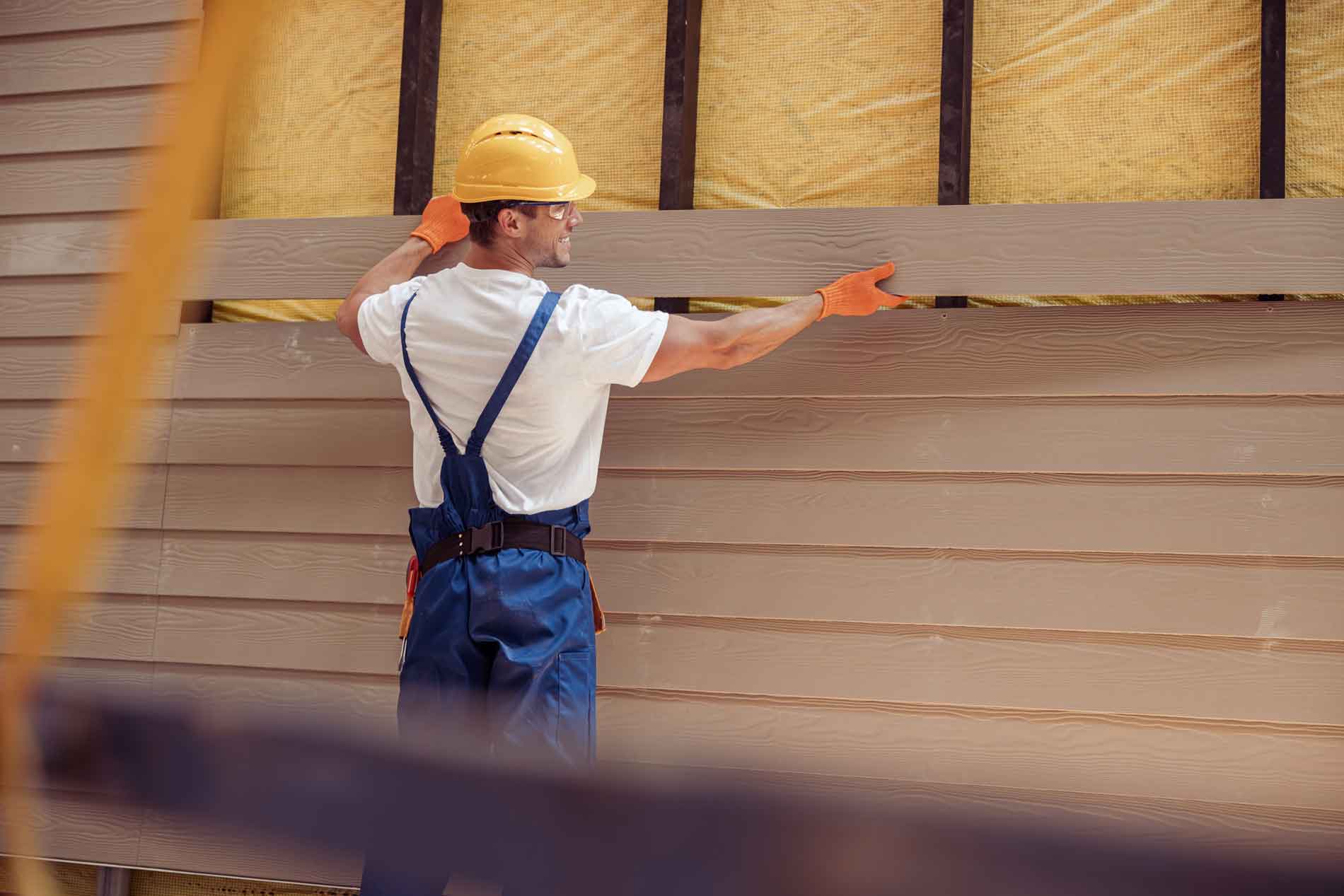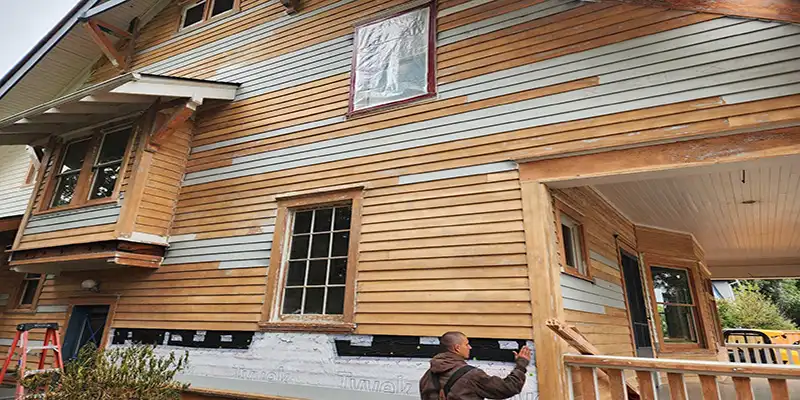Recognizing the Relevance of Timely Siding Repair for Long-Lasting Home Protection
Siding plays a crucial role in protecting a home from environmental elements. It works as the first line of defense against moisture, pests, and extreme temperatures. However, even minor damages to siding can rise right into significant concerns if left unaddressed. Homeowners frequently neglect these signs, leading to costly fixings and decreased building worth. Comprehending the significance of timely siding repair is vital for keeping a home's stability and visual appeal. What should home owners recognize when examining their siding?
The Function of Siding in Home Protection
Many home owners may overlook it, siding plays a crucial function in protecting a residence from different external hazards. Acting as the first line of protection, siding guards the structure from harsh climate conditions, including rain, snow, and extreme sunlight direct exposure. It stops moisture intrusion, which can bring about mold and architectural damages over time. Additionally, high quality siding acts as an obstacle against parasites, such as pests and rodents, which can endanger the stability of the home.
Siding contributes to energy performance by supplying insulation, helping to regulate indoor temperature levels and minimize home heating and cooling expenses. The material and condition of the siding can also impact the home's visual allure, affecting property value. A properly maintained outside boosts aesthetic allure while securing the home's structural components. Therefore, siding is not merely attractive; it is a vital component in making certain durable home security and comfort
Common Indicators of Siding Damage
When homeowners evaluate their residential or commercial properties, they might commonly neglect refined indications that indicate siding damages. One common indication is the existence of cracks or spaces in the siding material, which can permit moisture to penetrate. Furthermore, homeowners must search for bending or buckling, as these distortions can endanger the siding's integrity. Discoloring paint or discoloration might signal recurring exposure to the aspects, hinting at possible underlying issues. Moreover, if house owners notice mold and mildew or mildew growth on the siding, it can suggest trapped dampness that needs prompt interest. Boosted power costs might indicate that the siding is no longer offering sufficient insulation, necessitating additional examination. Recognizing these indications early can assist keep the home's exterior and avoid a lot more extreme problems later on. Routine examinations and prompt repair work can considerably extend the life of the siding and safeguard the home's general framework.
Effects of Overlooking Siding Issues
Ignoring siding issues can lead to substantial structural damage gradually, jeopardizing the integrity of a home. Additionally, homeowners might deal with raised power expenses because of bad insulation and air leaks. Ignored siding can produce an inviting environment for parasites, better aggravating repair service requirements.
Structural Damage Risks
Neglecting siding concerns can bring about substantial structural damage, positioning serious risks to a home's integrity. When siding comes to be compromised, moisture can infiltrate underlying structures, such as framing and insulation, which might lead to wood rot and mold development. Gradually, these conditions weaken the home's architectural parts, causing expensive repair work and potential safety and security dangers. Additionally, pests like termites can be brought in to harmed siding, intensifying the wear and tear. The home's foundation may suffer due to improper water drainage triggered by siding failing. Attending to siding troubles quickly is necessary to maintaining the overall security and safety and security of the dwelling, making sure that home owners avoid the long-lasting repercussions of architectural compromise.
Boosted Power Costs
Jeopardized siding not just threatens structural honesty yet additionally considerably impacts energy effectiveness. When siding is harmed or degrading, it develops voids and cracks that allow conditioned air to get away, compeling home heating and cooling down systems to function harder to preserve preferred temperatures. This inadequacy brings about increased energy consumption, resulting in higher utility bills. Homeowners may find themselves facing unanticipated prices as they try to make up for the shed power performance. In addition, insufficient insulation because of siding problems may intensify temperature fluctuations within the home, further straining a/c systems (siding repair greenville nc). Prompt siding repair is vital not just for maintaining the exterior of a home yet additionally for making certain power costs remain manageable and predictable with time
Bug Infestation Possible
Just how can property owners secure their residential properties from unwanted insects? Prompt siding fixing is essential in preventing parasite invasions. Damaged or weakening siding produces entry points for insects and rodents, which can result in considerable structural damage and health dangers. Termites thrive in compromised wood siding, while voids can attract rodents seeking sanctuary. Neglecting these issues permits insects to develop nests, compounding the issue and rising repair work prices. Additionally, problems can lead to contamination and the spread of conditions, positioning a hazard to the home. Normal evaluations and punctual repairs of siding can successfully deter insects, ensuring a risk-free and secure living atmosphere. Homeowners need to focus on siding maintenance to secure their homes from these possible invasions.
Advantages of Timely Siding Repair
Timely siding fixing provides house owners numerous benefits that expand beyond plain appearances. By dealing with concerns promptly, one can stop costly water damages, enhance power effectiveness, and improve the home's visual allure. These advantages add substantially to the total worth and longevity of the building.
Protects Against Water Damages
When homeowners neglect siding repair, they inadvertently increase the risk of water damages to their residential or commercial property. Siding serves as a vital barrier against the elements, preventing wetness from infiltrating the home. Damaged or degrading siding can create cracks, spaces, or bending, allowing rain and moisture to seep in. This breach can result in a variety of issues, including mold growth, wood rot, and architectural damage, which can be costly to treat. Additionally, water damages commonly jeopardizes insulation and creates a harmful living atmosphere. By dealing with siding repairs without delay, home owners can secure their investment and keep the stability of their homes. Prompt siding maintenance is crucial in protecting versus the potentially destructive effects of water damages.
Enhances Power Performance
Overlooking siding repair not just enhances the threat of water damages but additionally impacts a home's energy performance. Weakened siding can create gaps and splits, permitting air to leave and go into the home. This leads to enhanced energy usage as heating & cooling systems function harder to preserve wanted temperatures. Furthermore, obsolete or damaged siding may not give proper insulation, more intensifying power loss. Timely repair services can reinstate the protective barrier that siding uses, leading to significant cost savings on power costs. Additionally, improved power performance adds to a more comfortable living setting, as it aids maintain constant interior temperature levels throughout the year. Eventually, resolving siding issues promptly is vital for enhancing a home's general power efficiency.
Improves Visual Charm

Just how to Examine the Condition of Your Siding
While normal upkeep is necessary, examining the condition of siding must be a concern for any home owner worried regarding shielding their building. To begin this evaluation, a thorough visual assessment is essential. Property owners must seek signs of damage such as fractures, bending, or chips, which can show underlying issues. Additionally, inspecting for discoloration or mold can expose dampness troubles that might lead to further degeneration.
Physical examination additionally involves touching the siding. If it feels soft or spongy, this could represent rot or water damage. House owners need to focus on the seams and joints, ensuring they are undamaged and covered properly. Using a flashlight can help illuminate hidden areas and reveal prospective concerns. Lastly, it's a good idea to check the siding every year or after serious weather condition events, as very early discovery and prompt repair work can significantly extend the life expectancy of the siding and safeguard the home from future damages.
Selecting the Right Materials for Siding Fixing
After examining the condition of siding, homeowners must take into consideration the materials for repair. Picking the suitable siding product is necessary for making sure resilience and visual charm. Common alternatives include wood, plastic, fiber cement, and light weight aluminum, each with unique benefits. Wood supplies natural elegance and insulation however calls for routine upkeep. Plastic is low-maintenance and immune to fading, making it a prominent selection. Fiber cement incorporates sturdiness with convenience, offered in numerous styles and colors, while light weight aluminum is lightweight and resistant to corrosion but can be susceptible to nicking.
House owners need to likewise consider environment and local weather, as some products execute much better in certain environments. Furthermore, power efficiency, expense, and the wanted life expectancy of the siding must influence the decision. Eventually, choosing the best products can greatly affect the long life of the home's exterior and secure it from potential damages.
When to Call a Specialist for Siding Repair
How can house owners recognize when it's time to get professional help for siding repair work? A number of indications recommend that specialist intervention is necessary. Initially, if noticeable damages, such as cracks, warping, or openings, exceeds a few square feet, it may compromise the siding's integrity. Second, relentless moisture issues, consisting of mold and mildew or rot, signal underlying troubles that home owners might not be equipped to handle. Additionally, if the siding has actually shed its safety coating or reveals indicators of severe weathering, a professional assessment is called for. Home owners need to additionally consider their own skill level; if the repair work tasks seem frightening or past their experience, calling a specialist can assure the work is done appropriately. Lastly, if repair work are frequent or pricey, it may be time to evaluate the total condition of the siding and consider a full replacement, which a professional can aid identify.
Often Asked Questions
How Usually Should I Check My Siding for Damage?
Evaluating siding for damage should take place at the very least twice a year, preferably in spring and fall. Routine assessments assist determine issues early, stopping more considerable problems that may emerge from ignoring essential repair work.
Can I Fix Siding Myself or Hire a Specialist?
The decision to repair siding oneself or work with a professional relies on skill level and intricacy of damage. A home owner may select do it yourself for small fixes, while considerable repairs commonly warrant expert expertise for ensured top quality and safety.
What Is the Typical Price of Siding Repair Work?
The ordinary expense of siding fixing generally varies from $300 to $1,500, relying on aspects such as product type, extent of damages, and labor expenses. Property owners need to acquire quotes for specific estimates from regional specialists.
How Lengthy Can I Anticipate My Siding to Last?

Do Different Climates Affect Siding Toughness?
Different environments considerably affect siding durability. Severe temperatures, moisture, and precipitation can bring about increased wear. Severe winters may create fracturing, while high moisture can promote mold and mildew growth, reducing the siding's lifespan and efficiency.